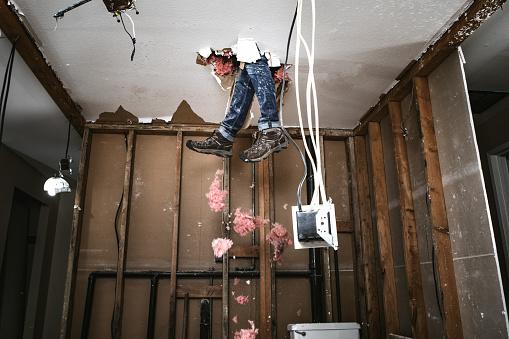8 Ways to Spot a Home Improvement Scam
 It’s home improvement season! Contractors of all kinds, from painters to builders, electricians, roofers and more, are hard at work sprucing up homes across the country.
It’s home improvement season! Contractors of all kinds, from painters to builders, electricians, roofers and more, are hard at work sprucing up homes across the country.
If you’re hiring anyone to make improvements on your home, be alert! Home improvement scams are more common than you may think. And they can be difficult to spot. According to the Better Business Bureau (BBB), home improvement scams in 2017 cost Americans more than $600,000 in losses. A contractor can con a homeowner in a number of ways, from doing sloppy work that requires more repair down the line to leaving a job unfinished, or even making off with their pay and doing no work at all.
Don’t let this happen to you! Read on for 8 ways to spot a home improvement scam:
1. The contractor insists on being paid up front
While most contractors will ask for a deposit toward their final fee when you hire them, be wary of any contractor who demands you pay more than a third of the total fee up front. This is likely a scammer who is trying to cover their bases in case of shoddy work or even a no-show.
2. The contractor refuses to supply references
Never hire a contractor without speaking to someone who’s used their services in the past. The Federal Trade Commission (FTC) advises homeowners to ask past customers detailed questions about a contractor’s work, including the projected and actual project timeline, as well as final cost. If a contractor is in the middle of another job, ask if you can check out their work yourself.
If a contractor refuses to furnish names and contact information of previous clients, it may be best to seek a new option.
3. There’s negative information about the contractor on the BBB site
Before hiring any small business you’ve never used, it’s a good idea to check them out on the Better Business Bureau (BBB) website. Once there, you can read reviews and ratings and see if any complaints have been filed against the company.
4. The contractor demands payment in cash
The FTC recommends paying contractors with a check or credit card so you can contest the charges if something goes wrong. Cash leaves no trail and makes it easy for a scammer to walk away from a job without doing much (or any) work at all.
5. The contractor will do the work for an insanely cheap price
Don’t get conned by a contractor who severely underbids all competitors. You might get lucky and find someone who is just starting out and can still do great work, or you might be dealing with someone who will cut every corner and end up costing you more than you thought you were saving. If you’re offered a bid that is a lot lower than the going price for the work, ask a lot of questions. If you only get evasive answers, look elsewhere.
6. They show up at your door … uninvited
The smiling contractor at your door claiming to have recently done work in your neighborhood just happened to notice your home can use some repairs, too. They suggest you hire them to do it for you–all for a great price, of course.
Don’t fall for every house call. There’s a small chance you’re looking at a rookie contractor just starting to build a referral base, but it is far more likely that your uninvited visitor is a scammer who will do sloppy work, leave the job half-finished or disappear with your money. If the contractor does seem legit, look them up on the BBB site and ask for references before hiring.
7. The contractor refuses to put anything in writing
Never hire anyone to do work on your home without a written contract. The BBB advises homeowners to include as many details as possible in the contract, such as payment terms, a definitive date for the start and completion of the project, warranty information and a clear description of the job.
8. They try to avoid permits
A contractor who tries to convince you there’s no need to pull permits is one who wants to avoid the authorities at all costs. You’re likely dealing with an unlicensed worker or who will cut corners wherever possible. The lack of proper permits can also cause you problems down the line when you try to sell your home.
Don’t get ripped off by a scammer! Do your homework well before hiring any contractors this (or any) season. It’s one surefire way to ensure your home improvement project goes smoothly and without unpleasant surprises.
« Return to "Blog Home"

